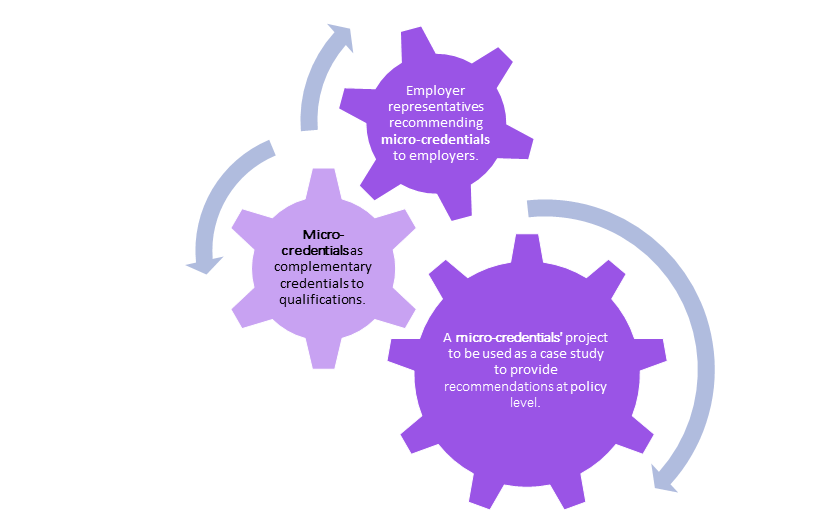Note from the Coordinator
Welcome to the official website of the MORAL project!
Addressing Learning & Employment Challenges in a MORAL Way
In the recent years, six key challenges in Learning & Employment have been identified across Europe that call for upskilling, with more of a focus on people entering the labour market in low-level and other positions to align their skill sets with the requirements of employers and on people belonging to disadvantaged groups to facilitate their employability.
More specifically:
- Green and digital transitions are reshaping the way we live, work and interact, and call for a shift in skill sets to reap their full potential.
- The Covid-19 pandemic made telework and distance learning a reality for millions of people in the EU, revealed the limitations of our digital preparedness, and negatively impacted job opportunities for many.
- Too many people cannot find a job because they do not have the right skills or they are working in jobs that do not match their talents.
- 40% of employers cannot find people with the right skills to fill their vacancies, while too few people have the skill sets and support to see setting up their own business as a realistic route.
- An unacceptably high proportion of Europeans – 1 in 5 – struggle with reading and writing, and even more have poor numeracy and digital skills.
- While everyone should have the chance to upgrade their skills on a regular basis, only 4 in 10 adults take part in learning.
Τo address these challenges, MORAL is developing a “Passport to Employment” (PTE), which includes 20 micro-credentials for life, green, digital, and entrepreneurial mindset skills from 4 European Competence Frameworks.
Upskilling through MORAL
What skills?
- Basic
- Vocational
- Technical
- Transversal
- Digital
- Green
- Entrepreneurial Mindset
How many skills?
- 20 key skills deriving from 4 European Competence Frameworks, selected by employers based on their requirements for newly recruited employees and/or employees in entry-level job positions.
The MORAL compass can help employees find their direction to personal development and professional success!

At a Glance
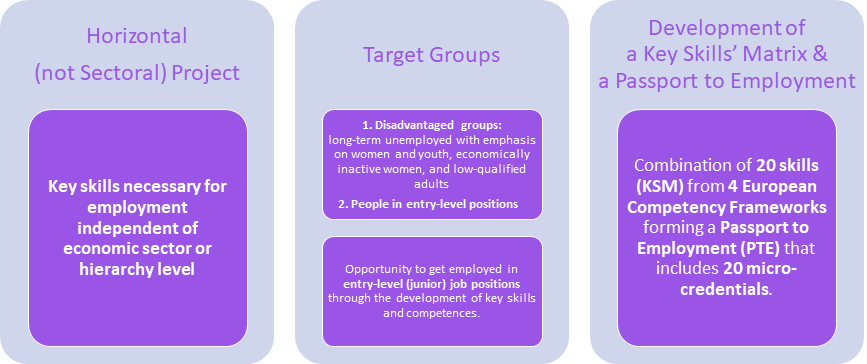
Aim & Objectives
MORAL aims to support disadvantaged groups (long-term unemployed with emphasis on women and youth, economically inactive women, and low-skilled adults) in entering the labour market and to upskill employees that are currently holding entry-level (junior) job positions, through the development and validation of Key Skills included in a ‘Passport To Employment’ (PTE). To this end, micro-credentials and asynchronous electronic learning materials for micro-courses are designed, developed, and pilot tested. The most important skills for employment are identified in four European Competency Frameworks (LifeComp, GreenComp, DigComp, EntreComp) through research (focus groups and a large-scale survey) with the participation of employers.
The project involves learners, employers and employer representatives, VET providers, and policy makers, who will benefit from the project activities as follows:
- Disadvantaged groups with be provided with a tool for accessing the labour market.
- Employees in entry-level (junior) job positions will be provided with an upskilling tool.
- Employers will be provided with a tool facilitating the selection of candidates for the labour market.
- Employer representatives will be provided with experience in the development of micro-credentials.
- VET providers delivering non-formal and informal trainings will be provided with experience in the development of micro-credentials, which can be transferred to other VET providers inside and outside the partner countries.
- Policy makers will be provided with insights regarding the possibility of using micro-credentials at the policy level (e.g., aligning them with Νational Qualifications Frameworks – NQFs).

Target Groups
- Employees in entry-level (junior) job positions with low skills and disadvantaged individuals (long-term unemployed with emphasis on women people and youth, economically inactive women, and low-qualified adults) with fewer employment opportunities
- VET providers
- Employers and employer representatives
- Policy makers
Employees in entry-level (junior) job positions with low skills and disadvantaged individuals (long-term unemployed with emphasis on women people and youth, economically inactive women, and low-qualified adults) with fewer employment opportunities:
- They participate in the pilot testing of the 20 micro-credentials and the learning content developed for the 20 key skills with the use of an electronic learning platform and by attending synchronous electronic learning revision classes, which will help them acquire/improve key skills for employment.
- They take a digital assessment on the 20 key skills to receive the micro-credentials in the form of a ‘Passport to Employment’ (PTE).
- They obtain European Digital Credentials for Learning based on the 20 micro-credentials granted to them, which will help them enter the labour market, in addition to their other qualifications and skills.
- They utilise the micro-credentials and the PTE to advance in the labour market/access the labour market.
VET providers:
- They participate in trainings on the design and development of micro-credentials.
- They are granted access to asynchronous electronic learning content for the development of key skills for employment.
- They participate in workshops on lessons learned regarding the development and issuance of micro-credentials, and on how these may be exploited further.
- They learn how to develop and validate the skills of newcomers in the labour market and disadvantaged groups.
Employers and employer representatives:
- They participate in focus groups and a large-scale survey to provide their views on key skills required for entering the labour market and working in entry-level (junior) job positions, considering also the difficulties faced by some disadvantaged groups when searching for a job.
- They participate in workshops on the lessons learned regarding the development and issuance of micro-credentials, and on how these may be exploited further.
- They are provided with a tool to assist them in the recruitment process.
- They acquire experience in the development of micro-credentials.
- They may select more easily candidates for their job openings through the micro-credentials and the PTE.
Policy makers:
- They participate in workshops on the lessons learned regarding the development and issuance of micro-credentials, and on how these may be exploited further.
- They are provided with recommendations for the utilisation of micro-credentials at policy level (interventions in the qualification systems, the connection with the NQFs, etc.).

European Competence Frameworks
‘Today’s world is interconnected and it’s changing rapidly. We all need to change and constantly adapt. Adaptation requires us to develop new skills, new know-how, and new competences’.
The European Framework for Personal, Social and Learning to Learn Key Competence Framework (LifeComp)
In May 2018, the Council of the European Union adopted an updated Recommendation on Key Competences for Lifelong Learning. These competences are fundamental to achieve personal fulfilment and satisfaction, develop ourselves and relate to others, learn how to learn, and keep being employable. They are also essential for social inclusion and our civic participation in society. Following this recommendation, the Joint Research Centre (JRC), the European Commission’s science and knowledge service, in collaboration with the Department for Education, Youth, Sport and Culture (EAC), developed LifeComp: The European Framework for Personal, Social and Learning to Learn Key Competence (2020), including competences that people need to develop troughout their entire life and are given a variety of names, such as ‘21st century skills’, ‘life skills’, ‘socio-emotional skills’, ‘soft skills’, or ‘transversal skills’. LifeComp entails 3 competence areas and 9 specific skills, described at eight proficiency levels through examples of knowledge, skills and attitudes.
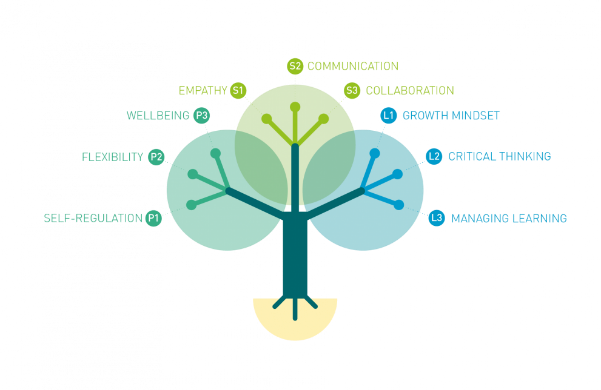
The Entrepreneurship Competence Framework (EntreComp)
The development of the entrepreneurial capacity of European citizens and organisations has been one of the key policy objectives for the EU and Member States for many years, and it is one of the eight Key Competences for Lifelong learningm, included in the European Reference Framwork (ERF).
The Joint Research Centre, in partnership with the DG Employment, Social Affairs and Inclusion, has developed EntreComp: The Entrepreneurship Competence Framework (2016, updated in 2018). EntreComp describes entrepreneurship as a lifelong competence, identifies what the elements that make someone entrepreneurial are, and describes them to establish a common reference for initiatives dealing with entrepreneurial learning.
The framework includes 15 specific competences in 3 competence areas, described at eight proficiency levels through examples of knowledge, skills and attitudes. Based on EntreComp, ‘entrepreneurship is when you act upon opportunities and ideas and transform them into value for others. The value that is created can be financial, cultural, or social’.
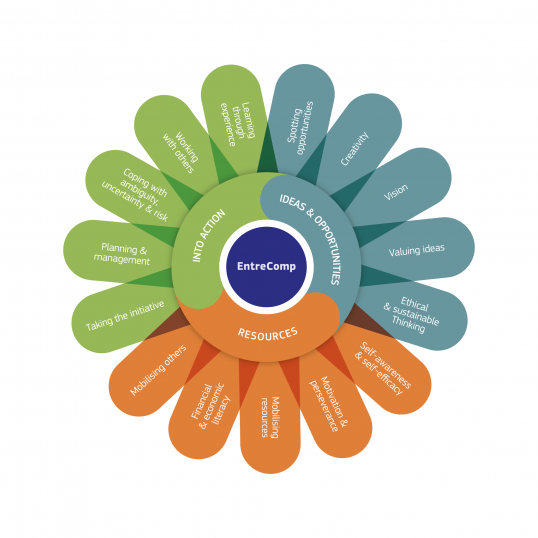
The European Sustainability Competence Framework (GreenComp)
The development of a European sustainability competency framework is one of the policy actions set out in the European Green Deal, as a catalyst to promote learning on environmental sustainability in the European Union. GreenComp: The European Sustainability Competence Framework (2022) is a reference framework for sustainability competences. It provides a common ground to learners and guidance to educators, advancing a consensual definition of what sustainability as a competence entails. It responds to the growing need for people to improve and develop the knowledge, skills, and attitudes to live, work, and act in a sustainable manner and it comprises 4 competence areas and 12 specific competences, at eight proficiency levels.
Sustainability competences can help learners become systemic and critical thinkers, as well as develop agency and form a knowledge basis for everyone who cares about the planet’s present and future state.
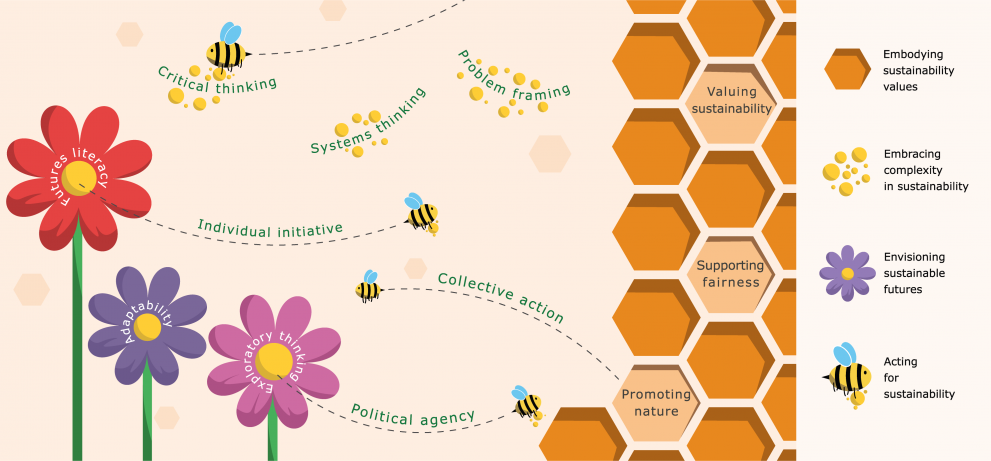
The Digital Competence Framework for Citizens (DigComp)
DigComp: The Digital Competence Framework for Citizens (2013), developed by the European Commission’s Joint Research Centre, identifies the key components of digital competence by providing cases in education and employment contexts. It entails 5 competence areas and 21 specific competences, described at eight proficiency levels through examples of knowledge, skills and attitudes. In DigComp, digital competence is defined as ‘…the confident, critical and responsible use of, and engagement with, digital technologies for learning, at work, and for participation in society. It is defined as a combination of knowledge, skills and attitudes.’ (Council Recommendation on Key Competences for Lifelong Learning, 2018). The framework remains crucial to the EU’s objectives in enhancing digital skills and it is being updated to reflect the evolving nature of digital competence. The latest (fourth) version is DigComp 2.2 (2022). It supports the EU’s Digital Education Action Plan 2021-2027, which in turn contributes to the Commission’s priority ‘A Europe Fit for the Digital Age’ and to Next Generation EU.
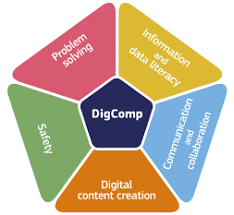
Micro-credentials
Small, targeted, flexible, and inclusive learning opportunities adapted to a fast-changing society and labour market, while not replacing but rather complementing traditional qualifications, designed and delivered by a variety of providers, in a variety of learning settings (formal, non-formal, or informal).
What they are
‘Α micro-credential is the record of the learning outcomes that a learner has acquired following a small volume of learning. These learning outcomes have been assessed against transparent and clearly defined standards. Courses leading to micro-credentials are designed to provide the learner with specific knowledge, skills and competences that respond to societal, personal, cultural or labour market needs. Micro-credentials are owned by the learner, can be shared and are portable. They may be standalone or combined into larger credentials. They are underpinned by quality assurance following agreed standards in the relevant sector or area of activity.’ (Recommendation of the Council of the European Union, 16 June 2022)
.
Why to acquire
- They can help certify the outcomes of small-tailored learning experiences.
- They make possible the targeted, flexible acquisition of knowledge, skills and competences to meet new and emerging needs in society and the labour market, while NOT replacing traditional qualifications.
- They can be designed and delivered by a variety of providers, in different learning settings (formal, non-formal, or informal).
